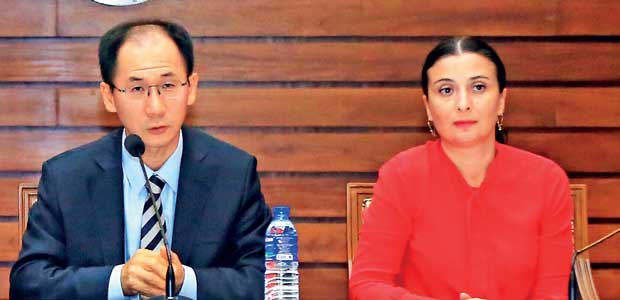Reply To:
Name - Reply Comment
 From left: IMF Mission Chief Jaewoo Lee and IMF Country Representative Eteri Kvintradze
From left: IMF Mission Chief Jaewoo Lee and IMF Country Representative Eteri Kvintradze
Pic by Damith Wickramasinghe
By Chandeepa Wettasinghe
The International Monetary Fund last week said Sri Lanka is so far doing well in its economic reforms to reach the targets to remain eligible for the US$ 1.5 billion Extended Fund Facility (EFF), despite the challenges posed by the recent climate shocks, which has slowed economic growth below 4.5 percent.
“Despite these somewhat challenging circumstances, policy performance on fiscal, monetary and reserve accumulation has been very strong, in terms of performance related to our programme agreements,” IMF Mission Chief Jaewoo Lee said.
A positive conclusion to the 3rd review under the EFF would lead to the release of the next US$ 251 million EFF tranche in November.
Lee said that the country has reached the June quantitative targets and is on track to reach the September’s continuous performance criteria required to be met under the 3rd review.
“The quantitative targets for June 2017, the size of fiscal balance, extent of revenue collection and the level of international reserves have all met the targets—meaning that policy performance has been fully satisfactory for the programme. September indicative targets; we still have a few more days till the end of September, but it seems to be on good track,” he said last week.
The IMF delayed the third tranche of US$ 167.2 million by three months, which was eventually disbursed in July, since the country was not able to meet the reserves accumulation target for December 2016.
Lee noted that the September indicative targets will be crucial in the IMF Executive Board giving the thumbs up for the release of the 4th tranche, and that a few more weeks will be required to finalize the September performance.
However, he said that a staff level agreement for the 3rd Review is nearing finalization, with just ‘a few ‘t’s to be crossed and ‘i’s to be dotted’. “We’re extremely close to reaching the staff level agreement, except for some fine tuning in some of the finer aspects of the programme,” Lee added.
Meanwhile, he said that continuing policy improvements is crucial, and that for fiscal policy, implementation of the newly passed Inland Revenue Act properly would be the next hurdle for the government.
Lee went on to say that although the overall budget deficit will be slightly worse than the expected at 4.6 percent of the gross domestic product this year, the government has until now reached the primary balance target, which is more important, and that indications are that the government will reach a primary surplus by the end of the year.
He said that improving debt management is also crucial.
“Turning to Central Bank policies, continuing the recent case of reserve accumulation will remain important to ensure external stability keeps on improving.
At the same time, continuing commitment to greater flexible exchange rate policy, and preparation for transition to flexible inflation targeting also remain very important,” he added.
The reserves have now reached US$ 7.3 billion, compared to US$ 6 billion at the end of 2016, while the Central Bank has allowed the rupee to depreciate.
Lee noted that although the weather related shocks contributed to growth slowing to below 4.5 percent, and inflation increasing, these metrics might improve next year. Although the Central Bank too is expecting improvements next year, it had projected the economy to grow between 4.5-5 percent this year.
The government is likely to package the state-owned enterprise (SOE) reforms and pricing reforms for fuel and electricity into the local government election propaganda, to ease the public into accepting the reforms, according to the IMF.
“The newly sequenced stages of reforms related to pricing formula and SOE reforms. We expect them to be incorporated into the electoral process,” Lee said.
He said that the two reforms are essential for improved public finance and for increasing transparency and accountability—the latter two, which are principles of the incumbent ‘good governance’ government—which would benefit the public in the long run.
“Electoral support provided to the government in terms of these reforms might actually strengthen the ability of the government to undertake the reforms,” Lee added.
The government was supposed to implement these reforms by December 2016 under the EFF, but now has re-sequenced the pricing formulae to come into effect on a staggered basis in March and September 2018 for fuel and electricity respectively.
Statements of corporate intent have been signed for key SOEs, but some SOEs, which the government has been planning for over two years to ‘commercialize’ with sale of shares in the stock market, are yet to take place.
However, Lee said that the exact manner in which the government convinces the public to tolerate the reforms will be left to the judgment of the government.
During the 2nd Review of the EFF, the IMF said that inability to restructure the SOEs and implement pricing formulae will result in a massive debt shock, which would increase the debt to GDP ratio from the current 85 percent, to 94 percent, and that it would take until 2022 to return to the current debt to GDP situation.